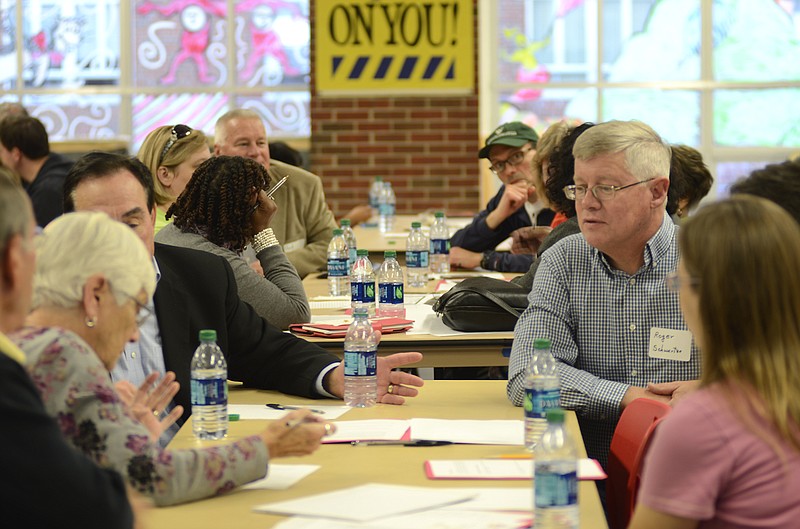At Sunday's town hall meeting to discuss school facilities in Jefferson City's public school district - the first since voters shot down a proposal to build a new high school that would have replaced the current one - more than 80 people expressed concerns and ideas ranging from space problems to the need to preserve any historic buildings in the district.
The first half of the 1.5-hour meeting consisted of introductions and information presented by Kenny Southwick, who was hired by the district to facilitate the process. In the second half, attendees broke into smaller groups to discuss implications, concerns and priorities of a long-range facilities plan.
"This is a much larger issue than whether you're going to build a new high school or have two high schools," he said. He later added: "The demon right now around us is status quo." By saying "that's the way we've always done it," the school district won't improve, and, over time, will decline, he said.
In one of the small groups, comments included:
• The assertion that the district can remodel some schools, rather than rebuild them. Others expressed concern about the district's financial ability to maintain its buildings, and getting to the point of "nickel and diming" the fixes.
• The importance of recognizing historical buildings and renovating them, such as has been done with the Miller Center.
• Jefferson City has a good parochial schools, so how do we convince them - as well as parents of grown kids - of the importance of adequate funding for public schools?
• The importance of keeping the neighborhood school concept.
Southwick said the district's enrollment has steadily increased from 2007 - going from 8,221 that year to 8,918 this year. Under a "medium" growth scenario, the enrollment is projected to be 9,657 in 2024.
"It's a given that you have great teachers, but school buildings do make a difference," he said.
Both Simonsen and West Elementary School are slightly over capacity, but other schools in the district have capacity for more students - a total of 463 more. But he said that statistic can be misleading, since classrooms can't necessarily be added to schools with a little extra capacity.
The average age of school buildings in the district is close to 50 years, with the high school right at the average and Simonsen 9th Grade Center the oldest at 99 years. The age of Jefferson City's public school buildings isn't uncommon, Southwick said, but he said, like a home, the older it is, the more maintenance it will require.
After voters in April rejected a bond issue that would have funded a replacement high school, supporters regrouped in August, agreeing to restart the process from ground zero, making no assumptions about eventual recommendations. A joint committee, one looking at space needs for secondary schools and one for elementary schools, formed with a total of about 35 people.
Chris Straub, a former superintendent of Jefferson City Public Schools and a member of the committee, expects more information and more participation by the public as the process moves forward. "For anything to be successful, you've got to have buy-in from the people who live and work in this community," he said.
Straub declined to share his opinion on how the district should address its space needs, saying there's likely more than one good solution.
The committee plans to spend about a year studying the issue during this second go-around. It will seek public input during two more public meetings, tentatively set for February and June, before presenting a plan to the school board in June.
"I'm going to challenge you to do something, each and every one of you," Southwick said. "And that is to have these conversations in the community."

